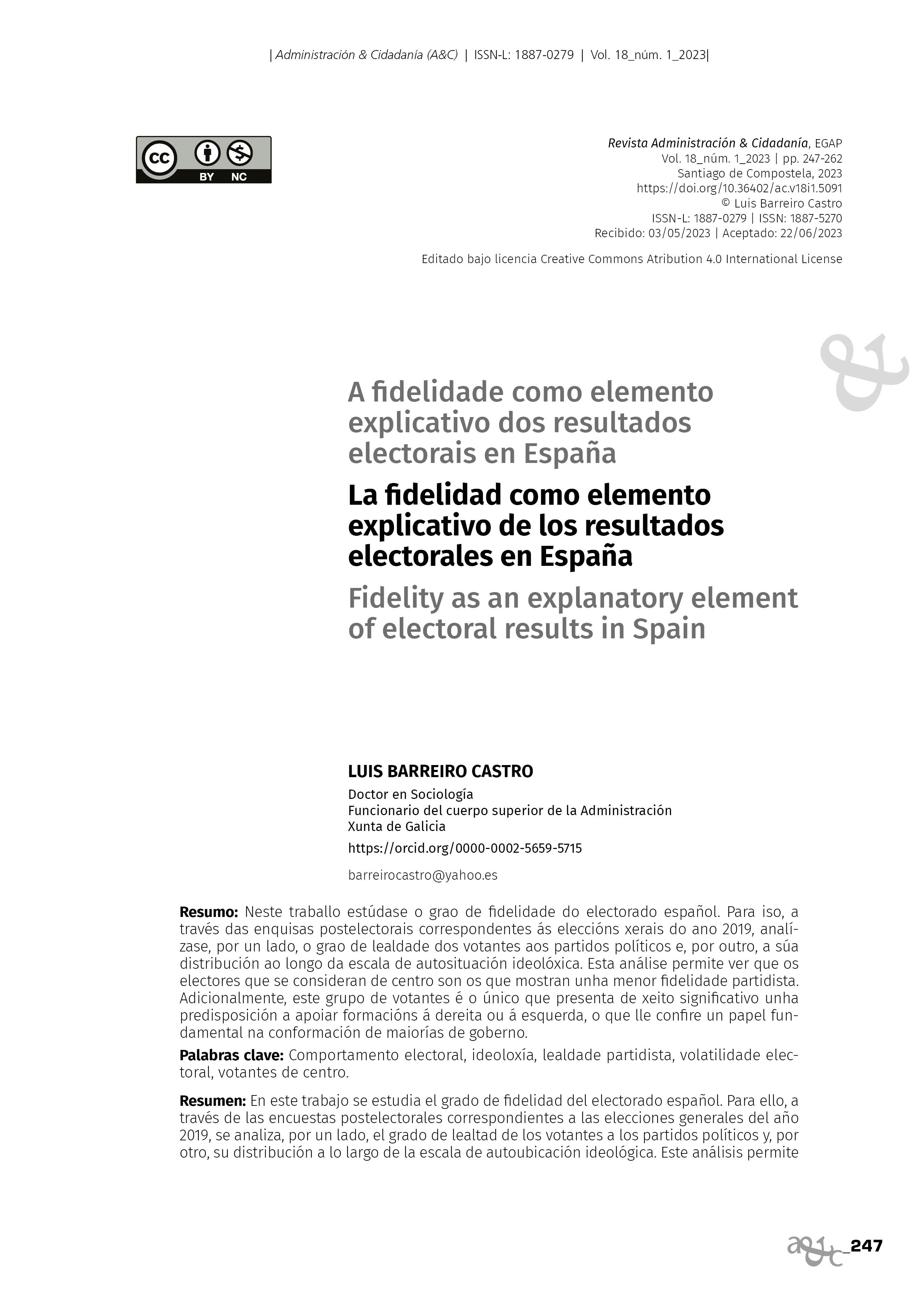Fidelity as an explanatory element of electoral results in Spain
Main Article Content
This paper studies the degree of fidelity of the Spanish electorate. To do this, through the post-electoral surveys corresponding to the 2019 general elections, analyse, on the one hand, the degree of voter loyalty to political parties and, on the other, its distribution along the scale of ideological self-location. This analysis allows us to see that voters who consider themselves to be from the centre are those who show less partisan fidelity. Additionally, this group of voters is the only one that significantly presents a predisposition to support formations to the right or to the left, which gives it a fundamental role in the formation of government majorities.
Article Details
Barreiro Castro, L. 2021. «La influencia del poder local en el comportamiento electoral. El caso de Galicia (2000-2020)», en Revista Administración & Cidadanía (EGAP), 16(2): 281-294. https://doi.org/10.36402/ac.v16i2.4853.
Barreiro Castro, L. 2022a. «El hábitat rural como medio facilitador del clientelismo. El caso de la provincia de Ourense (2000-2020)», en RIPS: Revista de Investigaciones Políticas y Sociológicas, 21(1). https://doi.org/10.15304/rips.21.1.7982.
Barreiro Castro, L. 2022b. «La racionalidad del votante rural», en Revista Administración & Cidadanía (EGAP), 17(1): 237-250. https://doi.org/10.36402/ac.v17i1.4974.
Berelson, B.R., Lazarsfeld, P.F. e McPhee, W.N. 1986. Voting: A study of opinion formation in a presidential campaign. Chicago: University of Chicago Press.
Campell, A., Converse, P.E., Miller, W.E. e Stokes, D.E. 1960. The American Voter. Chicago: University of Chicago Press.
Caplan, B. 2007. The myth of the rational voter. Why democracies choose bad policies. Princeton: Princeton University Press.
Downs, A. 1973. Una teoría económica de la democracia. Madrid: Aguilar (Tradución de L.A. Martín Merino).
Fraile Maldonado, M. 2007. «La influencia del conocimiento político en las decisiones de voto», en Revista Española de Investigaciones Sociológicas (REIS), 120(1): 41-74. https://doi.org/10.2307/40184833.
González Rodríguez, J.J. 2002. «Las elecciones generales de 2000. Voto ideológico/voto racional», en Revista Internacional de Sociología, 60(32). https://doi.org/10.3989/ris.2002.i32.1007.
González Rodríguez, J.J. 2020. «Bases sociales de la vieja y nueva política», en Cambio social en la España del siglo XXI. Madrid: Alianza Editorial.
González Rodríguez, J.J. e Bouza Álvarez, F. 2009. Las razones del voto en la España democrática, 1977-2008. Madrid: Los libros de la Catarata.
Goodin, R. e Klingemann, H. 1996. Comportamiento Político. Madrid: Istmo.
Lazarsfeld, P.F., Berelson, B. e Gaudet, H. 1944. The people's choice. New York: Duell, Sloan & Pearce.
Núñez, F. 2013. «Los partidos políticos tienen colocados a 145.000 españoles», en El Mundo, 10 de outubro. https://www.elmundo.es/economia/2013/11/10/527d579063fd3d281b8b457f.html.
Riker, W.H. e Ordeshook, P.C. 1968. «A Theory of the Calculus of Voting», en The American political science review, 62(1): 25-42. https://doi.org/10.1017/s000305540011562x.
Riker, W.H. e Brams, S.J. 1973. «The paradox of vote trading», en The American Political Science Review, 67(4): 1235-1247. https://doi.org/10.2307/1956545.
- Luis Barreiro Castro, La influencia electoral del poder local. El caso de Galicia (2000-2020) , A&C Journal: Vol. 16 No. 2 (2021)
- Luis Barreiro Castro, The rationality of the rural voter , A&C Journal: Vol. 17 No. 1 (2022): .

